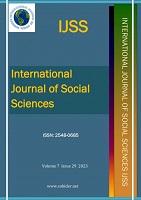Eğitim Yönetiminde Örgütsel Çatışma Kaynaklarının Çeşitli Farklılıklar Açısından İncelenmesi
Examination of the Sources of Organizational Conflict in Educational Management in Terms of Various Differences
Author(s): Sibel KiliçSubject(s): History of Education, Methodology and research technology, Evaluation research, Management and complex organizations, Sociology of Education
Published by: SD Yayınevi
Keywords: Educational Management; Organizational Conflict; Sources of Organizational Conflict;
Summary/Abstract: In this study, it is aimed to examine the sources of organizational conflict in educational management in terms of various differences. Conflict can sound eerie when considered in the form of a conceptual framework. It is a definition that is usually used in conjunction with the negativity, pain, hostility and burning that take place in our memory and thought. Conflict appears to us as an important concept from an individual point of view, as well as from an organizational point of view. The people who are in charge in the organization need the resources of the institution in order to realize their personal wishes and thoughts. If the resources are limited or their continuity is ensured, the dependencies on the resources increase. The failure of communication and interaction within the institution and the mediana in the medium is another cause of conflict. Thanks to communication, information and documents are constantly in interaction between the departments of the institutions. Dec. Failures in communication cause different blockages in corporate structures. One of the important reasons for the sources of conflict within the institution is the current status and power differences gained by individuals and units. In educational institutions, especially the increase of labor division and specialization is important in terms of increasing organizational competence. However, each unit can determine a wide variety of goals related to their own units, so that they can see the purpose of their own units as more important than the purpose of other units or the purpose of the institution as a whole. In educational organizations, if it is unclear who is responsible for which areas and issues, and to what extent and in what way, multiple people may be interested in similar issues. This situation prepares the ground for conflicts related to the management area. In this case, the conflict experienced in educational organizations leads to an increase and differentiation of resources.
Journal: Uluslararası Sosyal Bilimler Dergisi
- Issue Year: 7/2023
- Issue No: 29
- Page Range: 73-86
- Page Count: 14
- Language: Turkish

